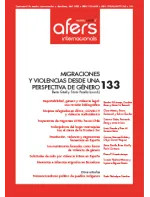Intimate violence as grounds for asylum in Spain and the politics of silence

Diana P. Garcés-Amaya, investigadora, Instituto Pensar, Pontificia Universidad Javeriana (Bogotá).d-garces@javeriana.edu.co. ORCID: https://orcid.org/0000-0001-6559-0783
This paper analyses the barriers to the recognition of gender-based persecution as grounds for asylum. It focuses on Spain and examines the rulings of Spanish courts on applications based on various types of gender violence between 2009 and 2019 and looks at the theoretical propositions of "the politics of silence". The paper proposes that these barriers can be attributed to the interweaving of androcentric and colonial frameworks that produce arbitrary representations of non-European women and their cultures. It also highlights the paradoxical way authorities deploy culturalisation strategies around female genital mutilation and forced marriage, treating them as "exotic" violence, in contrast to the strategies of invisibilisation and silence used with other types of gender-based violence, such as "intimate violence".
Keywords: gender persecution, intimate violence, asylum procedure, androcentrism, coloniality, Spain, courts
How to cite this article: Garcés-Amaya, Diana P. «La política del silencio frente a solicitudes de asilo por violencia íntima en España». Revista CIDOB d’Afers Internacionals, n.º 133 (abril de 2023), p. 161-181. DOI: doi.org/10.24241/rcai.2023.133.1.161
Revista CIDOB d’Afers Internacionals, nº 133, p. 161-181
Quadrimestral (January-April 2023)
ISSN:1133-6595 | E-ISSN:2013-035X
DOI: doi.org/10.24241/rcai.2023.133.1.161
Reception date: 05.09.22 ; Acceptance date: 10.01.23
>> The full text articles of this issue are available only in Spanish language